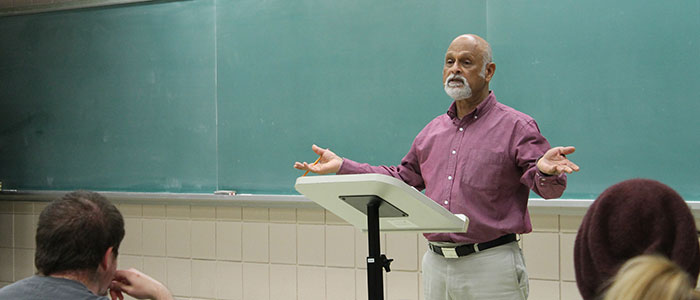News and Updates
Contact
Faculty of Social Science
Social Science Centre
Room 9438
Western University
T. 519-661-2053
F. 519-661-3868
E. social-science@uwo.ca
Recognizing 40 years of engaged education
April 06, 2017
For more than 40 years, Anton Allahar has tried to challenge others.
The professor of Sociology at Western University has challenged his students to think outside their comfort zone, and be engaged. He has challenged fellow faculty members whom he feels are training instead of educating students. He has challenged changes to universities that he believes have undermined the mission and goals of post-secondary education.
Throughout his career, his challenging approach has earned Allahar the respect of many students, and he has been recognized with numerous teaching awards. Allahar was a 2017 recipient of Western’s Award of Excellence in Undergraduate Teaching, co-presented by the University Students’ Council and the Western Alumni Association. He is the only professor ever to have received the award twice before, in 1996 and in 2003.
In 1987 Anton was honored with Western’s Edward Pleava Gold Medal and Award of Excellence in Teaching. Professor Allahar is also the recipient of the Ontario Confederation of University Faculty Associations (OCUFA) Award of Excellence in Teaching (2003), the 3M National Teaching Fellow Award of Excellence in Teaching (2005), a Western University Faculty Scholar Award and the Leadership in Faculty Teaching Award from the Ministry of Training, Colleges and Universities (2007).
With the end of the 2017 academic year, Allahar draws his teaching career to a close.
Allahar approaches teaching as a way to put knowledge in the service of humanity, and works to encourage his students to be engaged in the world. The university, Allahar said, is here to serve students and provide knowledge, not training. In the classroom, Allahar engages students in discussion, drawing out their opinions and inviting them to challenge him.
Throughout his career of forty-one years, Allahar feels there has been a decrease in engagement, by both students and teachers, as universities have moved from “education institutions to pseudo-vocational institutes.”
“Employers tell us to ‘stop trying to train them, educate them and leave the training to us.’ But university has become a training ground,” said Allahar. “Increasingly our students are better trained than educated, so they tend to make better followers than leaders. As individuals who are well-trained there is much they do not see.”
Increased focus on training and use of cutting-edge classroom technology has limited critical thinking and robs students of imagination. “Students have access to information but not the knowledge of how to evaluate it,” said Allahar. “When you lack an imagination, you can’t begin to imagine what you lack.”
His world-view is informed, in part, by his upbringing in Trinidad in the 1960s, during the momentous events of the Cuban Revolution and Cuban Missile Crisis. “I was afforded the best that colonial education had to offer. It was a classical liberal education that included literature, languages that included Latin and Greek, history, philosophy, and religion. But at no point did my colonial teachers ever imagine that I would one day turn that education against the Empire,” Allahar said.
Allahar recounts that his teachers, all Irish, Catholic priests, tried to demonize the Cubans, and instill fear in their pupils. Instead of being scared, Anton started reading about the revolution to better understand it. This changed his world-view as he came to question whether the priests were mistaken or simply lying about what was going on around him.
Allahar said he has an abhorrence of ignorance and “a deep, abiding disgust of double-standards” which have fueled his passion as a university teacher for four decades.
“I always thought it would be difficult when last lecture came,” said Allahar. “But the changes in the modern university mission plus the wider cultural transformations that I am witnessing have made it easier. I am ready to go, and my only hope is that I leave the university a better place than I found it, and my students better for my efforts.”

